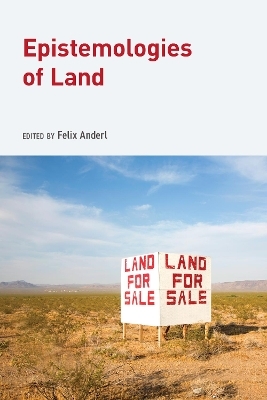
Epistemologies of Land
Rowman & Littlefield (Verlag)
978-1-5381-7644-3 (ISBN)
For the first time, this book brings social and historical epistemology into systematic conversation with research on land. How can we know land and understand its diverse meanings around the world and throughout history? In search of new ways in which land can be known, an interdisciplinary group of experts in this book demonstrates that not only is it important to learn about the plurality of meanings of land, but that knowing through land offers new ways of understanding social relations more broadly.
In a three-step process, this volume charts the project of land epistemology. First, three chapters present ways in which land can be known and reconstruct where such different knowledges come from. The second part of the book investigates why, despite this variety of land knowledges, one particular set of knowledge, land as capital, has become dominant. Thirdly, the volume highlights contestations of these dominant understandings of land, how they mobilize alternative knowledges and how they open up possible new ways of relating to land.
Land is at the centre of crucial public debates ranging from climate adaptation to housing and development, to agriculture and indigenous peoples’ rights. But these debates are frequently stuck because the meaning of land in different contexts is poorly understood. Bringing together specialists of epistemology and land, this volume is a landmark contribution to understanding land knowledge as a complex factor in these debates. Particularly, it offers techniques to know with and through land by engaging land not only as an object of knowledge but as a resource for understanding what can be known and how. Epistemologies of land presents a variety of ways in which land has been known in different historical contexts and investigates why knowledges of land have recently been reduced to a commodified form. In response, the book traces contestations of this meaning of land, and shows how alternative knowledges set off new and more sustainable ways of relating to land.
Felix Anderl is professor of conflict studies at the Center for Conflict Studies, Philipps-University Marburg. His research focuses on conflicts over land, food and rural development. Linking the disciplines of social movement research, international relations, and conflict research, he emphasizes field research, such as participant observation in social movements and the institutions they oppose.
Introduction, Felix Anderl
Part I: Commodifying (Knowledge of) Land
Chapter 1. The Land Organism: On the Multispecies Commons and Its Enclosure, David McNally
Chapter 2. Land as Capital: a Genealogy through the Birth and Development of Economic Thought, Leo Steeds
Chapter 3. Of ‘False Economies’ and ‘Missing Markets’: An Essay in three acts, Shailaja Fennell
Part II: Contesting Land Knowledge through Alternatives
Chapter 4. Stories at “Land’s End”: Emplacements and Displacements of Black Women's Land Epistemologies in the Colombian Caribbean, Eloisa Berman Arevalo
Chapter 5. What's in a land grab? Knowing Dispossession and Land in South East Europe, Katarina Kušić
Chapter 6. Land in Courts: Registers of Memory, Sovereignty, and Justice, Sakshi
Part III: Knowing and Unknowing Land
Chapter 7. Knowing and Unknowing the Countryside – Epistemological Implications of Rural Social Policy in Zambia, Anna Wolkenhauer
Chapter 8. On the EU’s Epistemologies of Soils’ Resourcefulness, or: Why Land and Soil Are Not the Same, Maarten Meijer
Chapter 9. From Epistemologies of Land to the Lands of Epistemology: Being and Becoming in the Agrocene, Inanna Hamati-Ataya
Index
About the Contributors
| Erscheinungsdatum | 18.01.2024 |
|---|---|
| Reihe/Serie | Global Epistemics |
| Verlagsort | Lanham, MD |
| Sprache | englisch |
| Maße | 157 x 237 mm |
| Gewicht | 449 g |
| Themenwelt | Geisteswissenschaften ► Philosophie ► Erkenntnistheorie / Wissenschaftstheorie |
| ISBN-10 | 1-5381-7644-0 / 1538176440 |
| ISBN-13 | 978-1-5381-7644-3 / 9781538176443 |
| Zustand | Neuware |
| Informationen gemäß Produktsicherheitsverordnung (GPSR) | |
| Haben Sie eine Frage zum Produkt? |
aus dem Bereich

![Was heißt Denken?. Vorlesung Wintersemester 1951/52. [Was bedeutet das alles?] - Martin Heidegger](/media/113619842)
